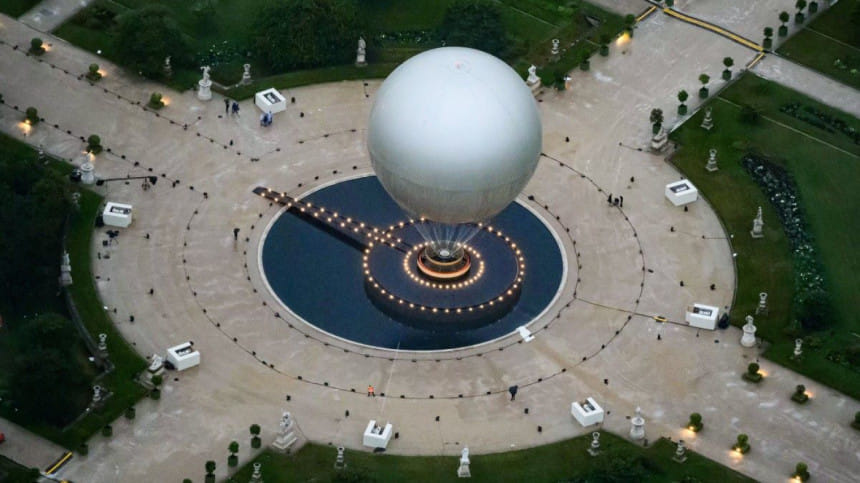Flame-free Olympic ring of fire becomes Games symbol

The Olympic cauldron tethered to a balloon in an iconic Paris park has become one of the hottest tickets at the 2024 Games with thousands flocking every day to see the seven metre (23 feet) wide ring of environmentally friendly fire.
The cauldron flies into the Parisian sky at sunset each day under a 30-metre balloon in the Jardin des Tuilleries park.
The flame made up of clouds of mist lit by LED rays has become a much-talked about symbol of the Games since it was lit by French sporting icons Teddy Riner and Marie-Jose Perec at Friday's opening ceremony.
Visitors now pack the park, with all available 10,000 daily slots to see the flame taken until the Games close on August 11.
Organisers have promised to add more slots. "We're victims of our own success," they said online.
- 'Join the party' -
Virginie Decosta took her 11-year-old daughter and 6-year-old son to the gardens at the weekend.
"It's for the kids, so they can join the party too," the 43-year-old told AFP.
Decosta and her husband are planning to see BMX and basketball, but their children will have to stay home.
"They won't have access to the Games," she said, adding that Olympic tickets were "too expensive."
"But at their level they understand the importance of what's going on," she said.
Paris's newest tourist attraction is free. Three hundred people are admitted to see the flame every quarter of an hour between 11:00 am and 7:00 pm.
- 'Message to the world' -
"It's beautiful," exclaimed Murielle Taupin, a retired police officer who was also among the first guests to see the flame.
The 52-year-old said she was somewhat "frustrated" at not being able to watch the opening ceremony up close.
"So I'm taking part in all the free outdoor competitions," said Taupin, who watched road cycling on Saturday and also planned to cheer on triathletes on Tuesday.
"With the Tuileries setting, it's magnificent," Taupin said.
Referring to what she called an "unbearable" political situation around the world, the spectacle also offered the chance to experience a moment of "sharing and communion".
"This balloon is about lightness, it's a message to the whole world," Taupin said.
For the first time in the history of the Olympic Games the flame is fuel free.
"A meticulous combination of a cloud of mist and beams of light, the Olympic Flame will flicker with electricity as its sole source of energy," French utility EDF said in a statement.
The ring "incorporates 40 LED spotlights to illuminate the cloud created by 200 high-pressure misting nozzles," the company said, adding that it ensured the flow of electricity and water 60 meters above the ground.
- 'Clean energy' -
French designer Mathieu Lehanneur, 49, said he wanted to make the cauldron as accessible, visible and open "as possible."
It is a nod to the hot air balloon invented by the Montgolfier brothers, the 18th century French aviation pioneers.
Wearing a cap emblazoned with the Olympic rings, American Nelly Li said she came "to admire this new invention, which is environmentally friendly and uses clean energy."
Baptiste Ferlin, a 35-year-old teacher, came to the Tuileries gardens to "enjoy the party."
Ferlin said he loved the idea of turning Paris into "an Olympic stadium" and is happily taking advantage of the opportunity to "experience the atmosphere of the Games."
Arriving from the Paris suburbs, he walked along the Seine before coming to see the flame.
"It makes for a wild party!"
Paris mayor Anne Hidalgo said she hoped the hugely popular balloon as well as the rings on the Eiffel Tower and the statues of 10 French women that were part of the opening ceremony could find a permanent home in Paris.
"We should explore possibilities for these three symbols," Hidalgo told the France Bleu broadcaster.
"These three artistic, symbolic and magnificent objects deserve our full attention."

 For all latest news, follow The Daily Star's Google News channel.
For all latest news, follow The Daily Star's Google News channel. 








Comments